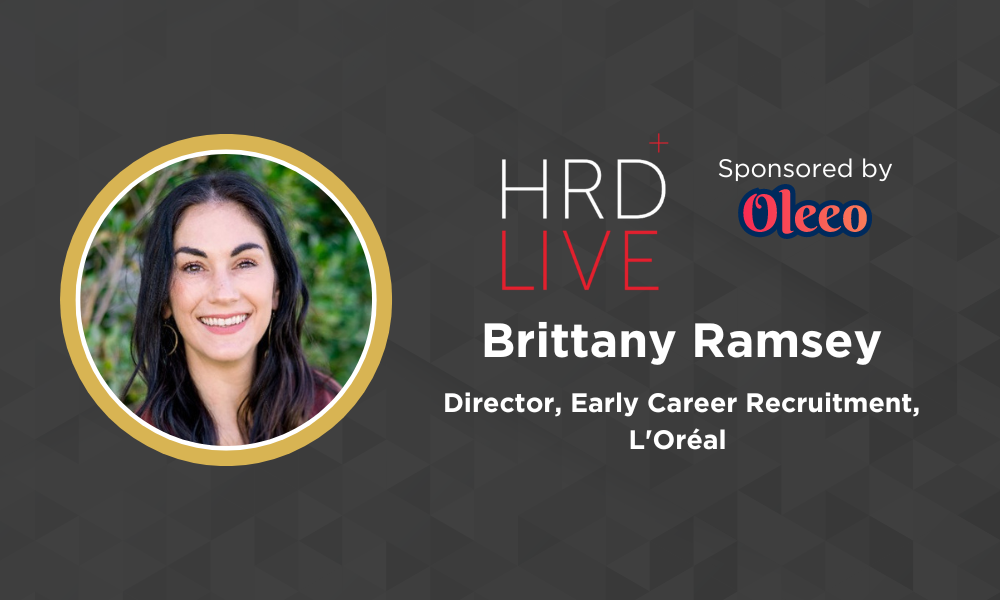Campus recruiting 101: The long-term solution to reactive hiring and skills shortages
- 5 Min Read
Brittany Ramsey, Director of Early Career Recruitment, L’Oréal USA, presents campus recruiting best practices to solve skills shortages in the future of work
- Author: Benjamin Broomfield
- Date published: Aug 23, 2023
- Categories

Podcast: Play in new window | Download Subscribe: RSS
In a recent focus group centered on future of work challenges, the HRD Global Advisory Board highlighted talent acquisition and skills shortages as a crucial priority for organizations to resolve. The board recommended a focus on campus recruiting but emphasized the increasingly competitive landscape for talent does still extend to early career hiring.
From engagement to onboarding, campus recruiting is increasingly saturated. Many leading organizations have well-established campus recruiting teams and the necessary infrastructure in place to support this type of hiring. Brittany Ramsey, Director of Early Career Recruitment, L’Oréal USA is an expert in campus recruiting and joins the HRD Live podcast to discuss best practices and inside knowledge on long-term, relationship-driven early career recruitment to win the battle for talent and develop a future of work-ready workforce.
Best practices for campus recruiting
Regardless of size, scale, or budget, it is important to establish a cohesive partnership between early career recruiting and overall talent acquisition strategy. “Pair and merge campus recruiting with experienced hiring,” highlights Ramsey. “If you’re looking at long-term talent retention, that’s probably the smartest thing you can do for your company.”
Tying campus recruiting to a broader talent acquisition strategy addresses long-term skills shortages. “Where are you seeing the biggest talent gaps around the three to five-year mark?” begins Ramsey. “If your gap is around sales… …what schools then have the skills that you need in the future?” By working backward, campus recruiting and talent acquisition teams can then develop the right program in partnership with universities to cultivate the skills they need.
Not every student from the school needs to have the skills the organization needs for the future, but by working with universities closely, they can develop a steady stream of candidates with the right capabilities. “Start with the gaps of your organization,” Ramsey notes. “Second, approach the universities based on those gaps. And then third, create a program in your own company that cultivates those skills so that the students can build and really grow into the future.” This method ensures a talent acquisition strategy based on long-term skills hiring, development, and retention rather than reactive hiring.
Building campus recruiting partnerships
Building long-term relationships with universities and other early career institutions plays a heavy role in remaining competitive. “Focus on breaking down the universities that you want to connect with today (short-term) and then long-term,” explains Ramsey.
By prioritizing institutions that are the most valuable to your organization, your talent acquisition teams can meet with schools one on one. This is beneficial, argues Ramsey, as you develop an understanding of how you provide value to their students and how they can offer value to you.
In the long term, this allows organizations to strategize a longer, more holistic strategy around each partnership. “Look at those short-term relationships as more authentic versus transactional,” she adds.
For more of Ramsey’s analysis on campus recruiting best practices, including industry shifts in the past twelve months to L’Oréal’s future priorities for skills and competencies, tune into the full HRD Live Podcast episode.
Timestamps
How has your approach to early careers and campus recruitment shifted over the past 12 months, and what talent trends are driving this shift?
What are some best practices for establishing long-term relationships with colleges and universities rather than one-off, transactional partnerships?
Are there any team structures you would recommend for early career recruitment teams, or should they operate as an extension of talent acquisition?
How can organizations use early career recruiting to adopt long-term solutions to skill shortages within their organizations?
What skills, competencies, or qualities will you be prioritizing from your campus recruiting efforts to prepare for the future of work?
Brittany Ramsey is the Director of Early Career Recruitment at L’Oréal USA. Brittany started her career at a non-profit as a clinical therapist for adolescents, and soon after found herself on a path into recruitment. Now with over 9 years of recruitment experience, Brittany has spent the last 5 years at L’Oréal all in various roles in Talent Acquisition. During her time at L’Oréal, Brittany has recruited across every function, and most recently as the Director of Early Career recruitment, leading the university strategy for all functional partners at L’Oréal USA including HBCU partnerships, diversity activations with NGOs and Student organizations, and other early careers activations.
_______________
Episode Sponsor
This HRD Live podcast episode is sponsored by Oleeo. Oleeo for Campus Recruiting offers an end-to-end talent acquisition system for hiring candidates in the early stages of building a career. Recruiters can track the best candidates and speed up the time to hire. With over two decades of experience providing recruitment technology for campus recruiting and early careers programs, Oleeo has supported the likes of CohnReznick, Evercore, LEK, Morgan Stanley, and Nomura. Oleeo offers a modern, affordable, innovative, and functionally-rich student recruitment solution with built-in Intelligent Automation to speed up the process and deliver a competitive edge. For more information visit www.Oleeo.com.








